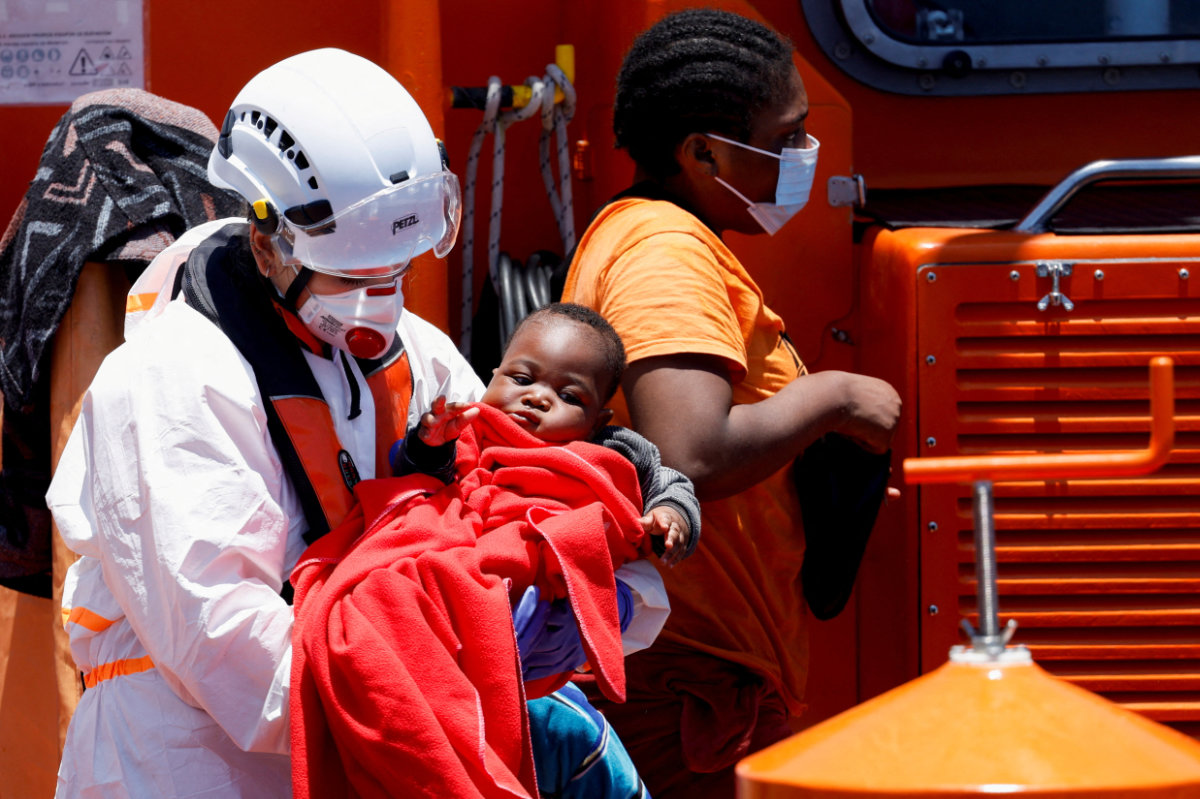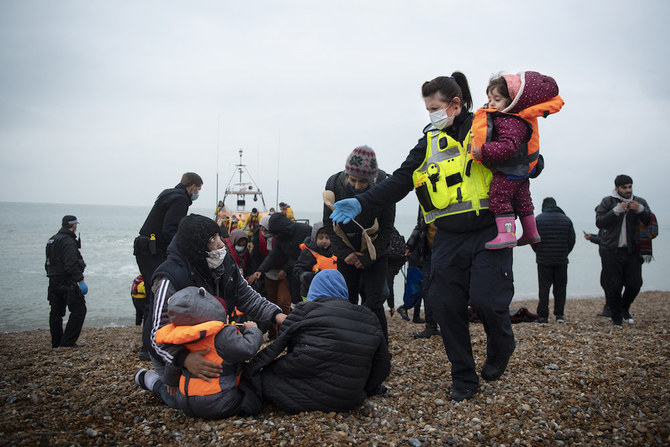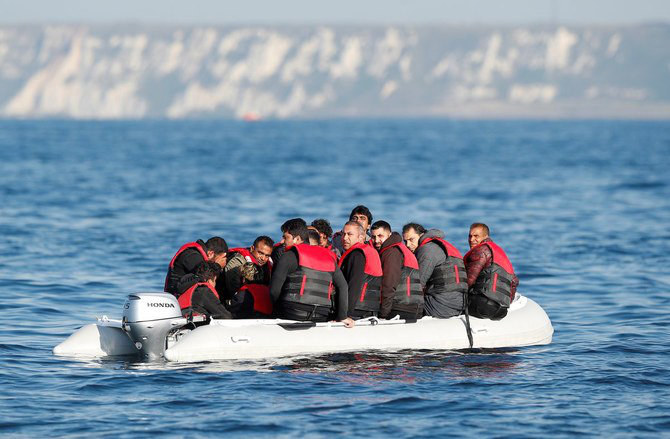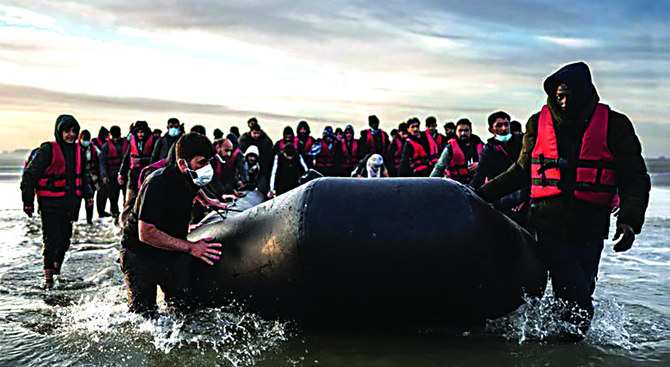LONDON: In April, the UK’s immigration minister issued an extraordinary order to staff at a center in Kent, southeast England, set up to process unaccompanied children seeking asylum after having arrived in Britain on small boats.
Murals of Mickey Mouse and other cartoon characters on the walls should be painted over, he said, as they were “too welcoming” and sent the “wrong message” to asylum-seekers, some of whom were as young as nine.
Robert Jenrick’s gesture was widely condemned as a “heartless” act of “abject cruelty” and a cynical bid to pander to “the rabid right” ahead of by-elections that many commentators believed would see Conservative MPs unseated, presaging a catastrophic defeat for the party at the next general election.

Britain's Minister of State for Immigration Robert Jenrick. (AFP)
In the event, on Friday the Conservatives lost two of the three seats they were defending.
But “Mousegate” is merely a symptom of a wider problem — the resurgence of a brand of right-wing politics across Europe in which populist parties are increasingly, and misleadingly, blaming refugees, migrants and asylum-seekers for every problem, from overburdened health services and housing shortages to rising crime and unemployment.
And all across Europe, such parties are gaining ground. Research by the ParlGov Project shows that right-wing parties now hold the majority of seats in the parliaments of 11 countries, including those on the front line of the migrant boats crisis: France, Italy, Greece and the UK.
For the right, the South-to-North migration crisis, which this year alone has claimed nearly 2,000 lives, is not a tragedy, but an opportunity. On Saturday the lead story in The Times of London reported that in the wake of the Conservatives’ by-election defeats, UK Prime Minister Rishi Sunak is “preparing to launch a more aggressive campaign in an attempt to shift Labour’s lead in the polls with divisive policies on crime (and) migrant boats.”

A rescuer helps a migrant child disembark from a Spanish coast guard vessel at the port of Arguineguin in the island of Gran Canaria. (Reuters file)
As well as dehumanizing the human beings behind the statistics, and the ongoing death toll among people desperate enough to risk their lives crossing the Mediterranean and the English Channel in wholly unsuitable boats, the generic lumping together of all those seeking sanctuary obscures important facts about where they are coming from, where they are heading, and why.
The nature of the exodus is changing, as the death toll following the capsize on June 14 of the overloaded fishing boat Adriana in the waters off Greece revealed.
INNUMBERS
2,761 People who drowned in the Mediterranean attempting to reach Europe in 2022.
881,220 First-time applications for asylum in Europe in 2022 — up 64 percent on 2021 figures.
80 percent Proportion of first-time asylum-seekers in Europe in 2022 under the age of 35.
(Source: IOM)
There were up to 700 people aboard the vessel, which had set out from Libya’s Tobruk, bound for Italy. Among the 108 mainly male survivors were people from Syria, Pakistan, Afghanistan, Egypt and Pakistan.
Hundreds more died, including women and about 100 children, who were reportedly locked below deck.
The day after the loss of the Adriana, the UN’s International Organization for Migration released data showing that last year 2,761 people drowned in the Mediterranean attempting to reach Europe from the Middle East and North Africa.
The report received very little media attention, unlike the saturation coverage of the hunt that month for four wealthy tourists lost in a submersible that imploded while on a sight-seeing tour of the wreck of the Titanic.

Migrants rescued by Tunisia's national guard during an attempted crossing of the Mediterranean by boat, rest in a tent at the port of el-Ketef in Ben Guerdane in southern Tunisia near the border with Libya, on November 27, 2021. (AFP file)
Over the past 15 years there has been a steady increase in the number of first-time applications for asylum in Europe, up from 121,600 in 2008 to almost 900,000 in 2022.
This is the highest number since the peak year of 2015, which was driven by the conflict in Syria and saw 1.28 million applications. With the trend rising since 2020, there is every prospect of that alarming record soon being broken.
The 881,220 applications in 2022 represent an increase of 64 percent over 2021, when there were just 537,355.
Tracking changes in the origins of these applicants serves not only as a barometer of global geopolitical events, but also highlights otherwise undetected trends.
For example, in 2022, Syrians, Afghans, Venezuelans and Turks lodged the most applications for asylum — together accounting for almost 40 percent of all first-time asylum applicants to EU states.
Syria has been the main country whose citizens have sought asylum in the EU since 2013, and the numbers continue to climb, up from 98,900 in 2021 to 131,970 in 2022.

Perhaps the most sobering statistic is that among the 30 countries whose citizens most commonly seek asylum in Europe, numbers increased in all but one case in 2022.
The largest increases were from Syria, from which there were 33,070 more applications in 2020, Venezuela (32,675 more), Turkiye (29,405), Colombia (29,280) and Afghanistan (28,940).
But alarm bells should be ringing in those countries that saw the largest relative increases in applications in 2022 — including India, with a 605 percent increase in applications for asylum by its citizens, Burundi (536 percent) and Peru (315 percent).
The only glimmer of hope in the statistics comes from Iraq, from which there were 605 fewer applications in 2022. A drop of just 2.3 percent, this could still prove to be a statistical blip rather than an indication of social and economic improvements in the country.
What is clear, however, is that many countries are losing the flower of their youth and, with them, hopes for a better future.

A migrant child, picked up at sea while crossing the English Channel from France, holds the hand of an adult, after disembarking from a UK Border Force boat in port of Dover, England, on May 3, 2022. (AFP)
Almost 80 percent of first-time asylum-seekers in the EU in 2022 were under 35 years of age, with most (53.9 percent) aged 18 to 34 and a quarter (25.2 percent) minors under the age of 18. More than 18 percent, of which half were girls, were younger than 14.
In the UK, meanwhile, the Conservative government, having decided the issue represents its best chance of staving off election defeat, is writing the playbook on the political exploitation of the “illegal migration” crisis.
Although the Court of Appeal has ruled the government’s plan to send asylum-seekers to Rwanda is illegal, it still plans to press ahead with the headline-grabbing policy.
Meanwhile, three barges have been leased on which the government plans to house hundreds of asylum-seekers — a red-herring attempt to pander to right-wing claims that it is wasting money housing migrants in supposedly “luxury” hotels.

A view of the Bibby Stockholm accommodation barge, which will house up to 500 asylum seekers, at Portland Port in Dorset, England. (Pool Photo via AP)
Despite protests from the House of Lords, the government has also rammed through parliament its controversial “Illegal Migration Bill,” a measure that according to the UN “will have profound consequences for people in need of international protection.”
In essence, in the words of the UN High Commissioner for Refugees, the bill “extinguishes access to asylum in the UK for anyone who arrives irregularly, having passed through a country — however briefly — where they did not face persecution.”
The bill, which perversely offers such asylum-seekers no safe and legal route, thus encouraging rather than stopping the boats, as UK Prime Minister Rishi Sunak has pledged to do, is “at variance with the country’s obligations under international human rights and refugee law.”
Alf Dubs, a former British MP and a member of the House of Lords, made a particularly poignant contribution to the debate about the bill. Dubbs, who came to Britain from Czechoslovakia in 1939 as a six-year-old Jewish refugee saved from Nazi persecution, condemned it as “a nasty piece of work.”

Former British MP Alf Dubs. (Twitter photo)
All across Europe, he added, “right-wing parties are seeking to exploit refugees for political gain, and have had some successes in France, Greece, Austria, Hungary and even Germany.”
Right-wing British politicians and agitators such as Nigel Farage, the architect of the UK’s disastrous withdrawal from the EU — which was driven largely by the confected need to “control our borders” — like to suggest the UK is bearing the brunt of the great South-North exodus. But that is simply not true.
In 2022, there were 74,751 asylum applications in the UK (of which, incidentally, only 45 percent arrived by small boats).
But by far the most popular destination for applicants in Europe in 2022 was Germany, which received 217,735 applications for asylum (24.7 percent of the total), followed by France (137,510), Spain (116,135), Austria (106,380), and Italy (77,200).
In other words, the UK was only the sixth most popular destination for those fleeing violence or persecution, or simply seeking a better life.
And drilling into the Home Office figures for “irregular migration” reveals a startling truth that undermines the government’s argument about the “illegal” status of those arriving in the UK on small boats.

An inflatable craft carrying migrants crosses the shipping lane in the English Channel towards the white cliffs at Dover in England on August 4, 2022. (Getty Images/AFP)
The truth, which the government chooses not to openly publicize, is that the majority of applications for asylum made by people arriving in the UK on small boats that have been considered have been approved.
In other words, even the Home Office recognizes that, far from being “illegal” migrants, most of those seeking sanctuary in the UK have solid grounds for doing so under international law.
Of the 88,221 people who arrived in the UK by small boat between 2018 and March 2023, 80,989 applied for asylum.
Almost three-quarters of these applications (57,371, or 70 percent), are still awaiting a decision, and 3,845 applications were withdrawn.
But of the 11,902 applications that have so far been decided, refugee status or other forms of leave to remain has been granted in 7,643 cases.

In this September 17, 2016, activists march in central London calling on the British government to do more to help refugees fleeing conflict and persecution. (AFP)
This means that, by the government’s own assessment, 65 percent of applications for asylum made by people arriving on small boats that have so far been decided on, are genuine and have been approved — a figure that would almost certainly be higher had the UK government not introduced its controversial “third country” rule in 2020.
Of the 4,259 applications rejected, only 1,266 were refused because they did not satisfy the standard for refugee status. But twice as many applications — 2,993 — were not considered “on third-country grounds.”
This change to the rules says people must seek asylum in the first safe country they reach, a requirement that the UN Refugee Agency says flies in the face of the Refugee Convention and international law.
Now the concern is that the UK government’s selective approach to international law will spread across Europe among other right-wing parties keen to exploit asylum-seekers for their own political ends.
Volker Turk, the UN high commissioner for human rights, has urged the UK government to reverse the law.
“The bill,” he said, “sets a worrying precedent for dismantling asylum-related obligations that other countries, including in Europe, may be tempted to follow, with a potentially adverse effect on the international refugee and human rights protection system as a whole.”

































